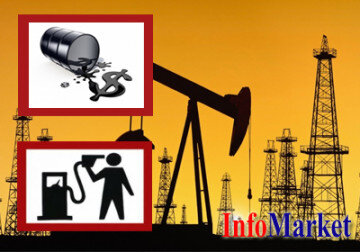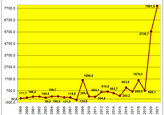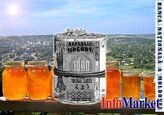
The trap for the oil products market
InfoMarket Commentary
Moldova will face a shortage of oil products in the second half of June 2021. It is not menace; it is almost a fait accompli. There is no need to explain to anyone what this is fraught with for the economy.
In the struggle for what politicians call "a fair price" and against what they call "cartel collusion" - neither the one nor the other has so far been proven publicly and documented: the oil products market has fallen into a stalemate. The National Energy Regulatory Agency (ANRE) is to develop a new Pricing Methodology for oil products within a month. Considering that the amendments to the law on the oil products market took effect on May 14, 2021, the market should operate from June 15, 2021 already under the new Methodology. ANRE organizes public hearings on the developed draft of the new Pricing Methodology, invites market operators to participate, but the format of the online conversation resembles a conversation between a deaf and a dumb. And this is almost exactly what it seems.
One gets the impression that ANRE organizes public hearings only in order to comply with all the formalities. This attitude is not new for the operators of the oil products market. They have been confronting with it at least since the beginning of the year: it first occurred when they submitted their proposals on the text of the draft law on the new Pricing Methodology to ministries, then to the government, and later to the parliament. None of the proposals of the market participants were taken into account at any stage of the "discussions". Someone decided to "push the law through"; someone "pushed it through". Those who voted for it are now campaigning. ANRE's management, “in order prevent something bad from happening,” observes the law to its fullest extent. Ultimately, the market reacts appropriately to the situation.
None of the major market operators took part in the second Methodology hearing held last week, due to complete disregard of their arguments and proposals on the part of all authorities. Their interests at the hearing were represented by the executive director of the Foreign Investors Association (FIA) Ana Groza.
So why is the market in danger of collapse? First of all, as Ana Groza noted, the law passed by the parliament, which provides for the introduction of a new Pricing Methodology for oil products, contradicts the law on accounting and financial reporting. The new provisions of the law on oil products provide for the application of the new Pricing Methodology in respect of each consignment of fuel imported to Moldova (gasoline, diesel fuel, liquefied gas), but this contradicts the country's financial legislation.
“With the introduction of this Methodology, companies will not be able to carry out accounting for each batch, hence they will come to the only decision: to suspend their sales in order not to violate the accounting law,” Ana Groza emphasized.
And these are not threats. Choosing between violating the law on oil products market and violating the law on accounting, a sane economic agent, understanding the possible consequences, would prefer to suspend his activities. And, as representatives of three of the four largest market operators told InfoMarket Agency, no one will violate any law, even under the threat of license revocation.
ANRE is well aware of the current situation, but the officials decided to comply with the law, that's why they are officials. Once the parliament has decided, the law must be implemented. Commenting on Ana Groza's statements, ANRE director Eugen Carpov noted that the agency is aware of the contradictions between the adopted amendments to the law on the oil products market and the logic and the law on accounting.
“We understand and have tried to analyze these provisions under various aspects, but have not found a physical or legal opportunity to go down a different line. The law has been passed. This is an organic law. And if it contradicts other laws, the contradictions must be corrected by the legislators, which is now impossible,” Eugen Carpov emphasized. He also noted that for this reason, ANRE will not be able to exclude from the new Pricing Methodology the provision stipulating the determination of the price for each consignment of goods.
Eugen Carpov also repeatedly stressed that the author of the law, ex-MP Alexandru Oleinic, was invited to both the first and second hearings, since he could clarify the situation, but he did not respond to ANRE's invitations.
The fate of this law is quite interesting. It was one of the last to be adopted by the now dissolved parliament, and this happened against the backdrop of political confrontation. Everything was developed according to the standard scheme: first, a wave of dissatisfaction with the rise in prices for oil products arose along with accusations of cartel collusion and later - parliamentary hearings. Following the hearings held on March 12, 2021, the parliament expressed a vote of no confidence in ANRE and the Competition Council and asked their leaders, Veaceslav Untila and Marcel Raducan, to resign. But the official resignation procedure was not started. The Competition Council was given a month to submit a report on whether there is a cartel agreement on the oil products market or not.
By the way, one of the MPs subsequently published part of the Competition Council's report and stated that there was evidence of a cartel conspiracy. At the same time, referring to the "secrecy of the investigation", the MP did not publish any specific examples or company names.
A week after the expressed vote of no confidence in ANRE and the Competition Council, on March 18, parliament adopts amendments to the law on the oil products market in the first reading; on April 9 - in the second. At the same time, during the parliamentary hearings, the MPs voted for ANRE to set prices, while the result was a completely different document, according to which ANRE approves the new Pricing Methodology stipulating that market operators must set the price for each imported batch.
On May 5, the President promulgates the law, which, after publication in Monitorul Oficial (the Official Journal of Moldova), takes effect on May 14, 2021. The President then stated that the law requires revision and the new parliament will have to revise it.
Hence, everyone, the MPs who voted for the law, and the President who promulgated the document, will be responsible for what will happen in the oil products market of Moldova starting June 15.
And, as the ANRE director Eugen Carpov noted during public consultations on the new Pricing Methodology, “The adopted law leaves us very little room for maneuver. It is short and includes fairly precise and tough provisions that we have neither the ability nor the competence to bypass or interpret in any other way than was envisaged by the legislators. "
Tudor Copaci, who headed ANRE in 2017 - 2019, commented for InfoMarket Agency on the proposed new Methodology: “Unfortunately, the parliament adopted amendments to the law without final agreement with ANRE and consultations with the industry, therefore, contradictions arose. In my opinion, the best practice for regulating prices in the oil products market was the one under which ANRE set tariffs three years ago, once every two weeks. But even once every two weeks is often, the market did not have time to react even then, so it would be optimal to set prices once a month. Even when there are surges in international markets or the exchange rate of the MDL changes greatly, during a month such fluctuations are absorbed by the average price for the period.”
But as for the Methodology, here ANRE still has room for maneuvers. In addition to the fact that importers, physically and according to the accounting law, will not be able to set prices for each imported consignment of fuel, ANRE has established in the draft Pricing Methodology that the matter will concern not only the wholesale price, but also the retail one. The law only mentions retail, so the inclusion of the wholesale price in the formula is exclusively an initiative of ANRE specialists. Market operators do not agree with this: the commercial margin on wholesale and retail, in their opinion, is irrelevant, all companies have different opportunities and priorities, therefore the final price on the gas station panel is important for the consumer. And in this case, from their point of view, the ANRE initiative is inappropriate and incorrect.
In the new pricing formula, ANRE proposes to take into account the commercial margin (profitability of the company), based on its average value over the last 5 years. That is, the margin a company registered over the past 5 years should be applied in the new Pricing Methodology. Market operators believe that for the first year it is necessary to take into account the margin for the previous year, without stretching it for 5 years. And here is the reason for this.
Over the past 5 years, the market has been subject to negative influences, including political ones. In the period from June 2018 to March 2019, by a court decision, prices for oil products were frozen and during this period the companies did not have at least a minimum profit every month, which was offset by losses for other months. And last year's pandemic emergency forced companies to increase spending on the Health Emergency Commission, while sales plummeted 40%, which also led to a sharp decline in industry profitability.
In addition, any period longer than one year must take into account the annual increase in certain costs that do not depend on companies: an increase in local taxes, the average salary in the economy, discounts that budget organizations require, payment of mandatory bank guarantees during tenders. Also, market participants need to comply with the requirements of the regulation on the control of emissions of volatile organic compounds through investments in the production of renewable energy sources. That is why operators consider it expedient, at least for the first year of the Methodology, to take into account exactly the marginality period of one year, while taking into account the actual costs and potential profitability if the companies incurred losses. It was mentioned that it is necessary to take into account annual inflation, and this indicator was not included by ANRE at all in the draft new Pricing Methodology.
On behalf of the largest market operators, Ana Groza notes that the industry is in favor of regulation, but transparent and predictable one, so that companies can ensure that all the started processes continue.
Where have we come to? In addition to some provisions regarding the formula of the draft new Pricing Methodology (the inclusion of wholesale in it, the determination of the commercial margin for the last 5 years, the lack of accounting for annual economic indicators), the main issue that persists is the impossibility of setting the price for each consignment of imported fuel without violating the current legislation.
ANRE also admits that this provision of the law on oil products contradicts the provisions of the law on accounting and financial reporting: Eugen Carpov noted this during public discussions. But ANRE intends to comply with the law on all its items. And if importers refuse to import fuel (at least in the same volumes) under the new Pricing Methodology, so as not to violate any of the laws and subsequently not to be fined, then Moldova is likely to face a fuel crisis. // 31.05.2021 - InfoMarket.






